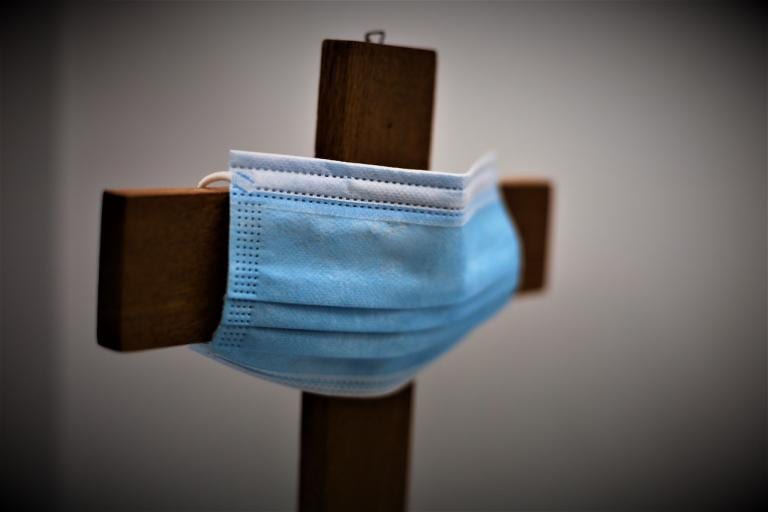During the COVID-19 epidemic, churches have implemented rigorous social-distancing and hygiene protocols. But after this particular disease runs its course, it might come back. Other epidemics might break out. And there are lots of other diseases out there that people can catch. Should churches continue their anti-coronavirus practices to keep people from getting sick?
Some people are advocating that, at least to a certain extent. Gordon College biology professor Craig Story has published an interesting article in Christianity Today: Biologist: COVID-19 Made Me Reevaluate Church Hygiene Practices with the deck [that is, a description of the story after the headline] “Churches have responded to public health issues before. Will today’s pandemic change future practices?”
From the article:
Congregational singing is getting most of the attention today, but there are so many other opportunities to spread contagious illness at church. The moment you enter, a greeter offers a warm handshake; then church members enthusiastically exchange the passing of the peace with a touch, handshake, or hug. Next, an usher circulates the offering plate around, and then—everyone partakes in Communion.
Will the lessons we are learning now lead to permanent changes in church practices?
He raises the prospect of choir singers wearing masks to prevent their joyful noise projecting infected particles into the air. Air-borne diseases are less transmittable outside, so maybe churches should move out of their sanctuaries to hold outdoor services. As for Communion, that is going to be unsanitary however you practice it.
Here is what some congregations are considering and doing [my bolds]:
Andrew Smith, a pastor in Kennett Square, Pennsylvania, mentioned the likelihood of not holding a separate children’s ministry and said, “we’ll probably look at two services instead of one to allow for social distancing.” Alex Burgess of Ward Hill, Massachusetts, and Steve North of Grand Rapids, Michigan, both mentioned holding outdoor services, weather permitting. . . .
Several of the pastors in my personal network have been working to make Communion more pandemic-proof, including having people bring their own elements. One fascinating variation is from pastor Micah Smith of Vancouver Island, British Columbia. He mentioned that his church tried doing online Communion by pantomime, with no elements, explaining he’d heard of persecuted churches doing this in prison. “I wanted to borrow meaning from that practice of Communion when we don’t have full gathering as we can’t all be together, rather than everyone grab whatever bread and whatever drink they choose,” he said. “That felt individualistic, and I wanted to feel the loss of our full practice even while observing it.”
Prof. Story says that new research shows that just being outside is not the protection it was thought to be. He recounts how the little individualized plastic cups replaced the common chalice in many church bodies, due at first to an article in a medical journal in 1897. The switch was accelerated, he says, due to racism, so that white people would not have to drink from the same cup as black people. (But were churches that integrated in the early 1900’s?) The AIDS epidemic also caused many congregations to switch to the plastic shot glasses, though research found that the disease couldn’t be spread that way.
“Though the single-cup movement was correct that a shared Communion cup is not a good public health practice,” Prof. Story concludes, “this coronavirus outbreak, as well as common colds, flu and such are very likely to spread in churches whether or not Communion is happening.”
He says that churches should incorporate common-sense measures, such as more hand-washing and more intentional cleaning. Members–including choir members–should get in the habit of wearing a mask when they are sick (for example, when they have a cold and are coughing or sneezing). But probably not otherwise, unless another specific epidemic breaks out.
He doesn’t really address whether or not churches should have greeters, passing of the peace, offering plates. and the informal hugging and hand-shakes that have become staples of congregational fellowship.
I agree that common sense is called for. I have heard calls for “courage” in the face of disease, but the issue, especially for Christians, should not be so much fear that I will get sick, as fear that I might cause someone else to get sick. Not love of self, but love of neighbor.
But there is another issue: Do we really think we can protect ourselves from the human condition? Disease has afflicted human beings from the beginning, and eventually our bodies will break down and the consequent disorders will kill us. Yes, modern medicine is doing wonders, and we should encourage and be glad of that. But it has its limits. We can’t expect to be perfectly insulated from every thing that can make us sick or kill us.
Yet we seem to have that expectation. We cannot attain a social utopia or perfect health or constant happiness. That doesn’t mean we shouldn’t do what we can to improve our society or our personal well-being. But we shouldn’t let unrealistic expectations harm our society or our well-being.
Even if churches cut out singing and all human contact, its members will still get sick and will still eventually die. The same will be true for people who only worship online or who never worship at all.
Human beings breathe the same air, touch each other, and touch the same things. We are not isolated individuals in bubbles; rather, we are all bound together and share the same condition. This is why we can have empathy and solidarity with each other.
This is also why God gave us an immune system. Yes, it can get overwhelmed and it might not work when it encounters something that it has never dealt with before. But our immune system does protect us from the everyday germs and viruses that are all around us. And if our level of hygiene were so complete that our immune system had never encountered them, we would be vulnerable to the least bacteria that slipped through.
We dare not become so careful, so averse to any kind of risk, that we pull away from each other. That would make communities, economies, nations, cultures, and churches impossible.
Image by Jeyaratnam Caniceus from Pixabay














